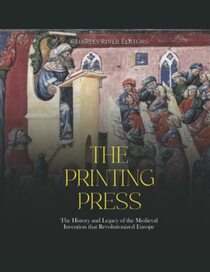One of the things we forget is that the printing press made the Renaissance possible. It also made the Reformation possible because Martin Luther encouraged people to read the Bible to understand God's message to each person (not filtered through priests or the Church).
The Chinese were early masters of the written word. They invented paper in 105 CE. Incredibly, the oldest printed book is THE DIAMOND SUTRA, a conversation between Confucius and a disciple, Subhuti, dated 868 CE.
However, early printing was done with woodcuts, a slow and laborious process. My father was a bookbinder who owned his own business at times. I remember setting type (putting letters backward, with spaces to keep the words apart) over the years. It was a tedious process, but typesetters got better with experience. When the linotype machine became available in America, anyone who could afford it bought them because they were so much faster.
Obviously, this story wasn't long enough. Hence, the authors inserted a long spiel about Martin Luther and his battle with the Catholic Church and Pope Leo X. Twenty-plus pages were spent on this, which was only peripherally related to the printing press. One interesting factoid is that Martin Luther, by translating the Bible into German, helped to standardize the German language. As the Catholic Church was trying to put a lid on Luther's writings, they destroyed printing presses and threatened printers. One telling quote from this eBook is, "Before the phenomenon of print, "only the Roman Catholic priest could 'speak to God.'" (page 56). Amazingly, Luther was the author of 33% of the books printed in Germany.
The rest of the book highlights the growth of newspapers and the continual changes to the printing press until the 1950s. The printing press is considered the most important invention in medieval Europe.
The Chinese were early masters of the written word. They invented paper in 105 CE. Incredibly, the oldest printed book is THE DIAMOND SUTRA, a conversation between Confucius and a disciple, Subhuti, dated 868 CE.
However, early printing was done with woodcuts, a slow and laborious process. My father was a bookbinder who owned his own business at times. I remember setting type (putting letters backward, with spaces to keep the words apart) over the years. It was a tedious process, but typesetters got better with experience. When the linotype machine became available in America, anyone who could afford it bought them because they were so much faster.
Obviously, this story wasn't long enough. Hence, the authors inserted a long spiel about Martin Luther and his battle with the Catholic Church and Pope Leo X. Twenty-plus pages were spent on this, which was only peripherally related to the printing press. One interesting factoid is that Martin Luther, by translating the Bible into German, helped to standardize the German language. As the Catholic Church was trying to put a lid on Luther's writings, they destroyed printing presses and threatened printers. One telling quote from this eBook is, "Before the phenomenon of print, "only the Roman Catholic priest could 'speak to God.'" (page 56). Amazingly, Luther was the author of 33% of the books printed in Germany.
The rest of the book highlights the growth of newspapers and the continual changes to the printing press until the 1950s. The printing press is considered the most important invention in medieval Europe.




